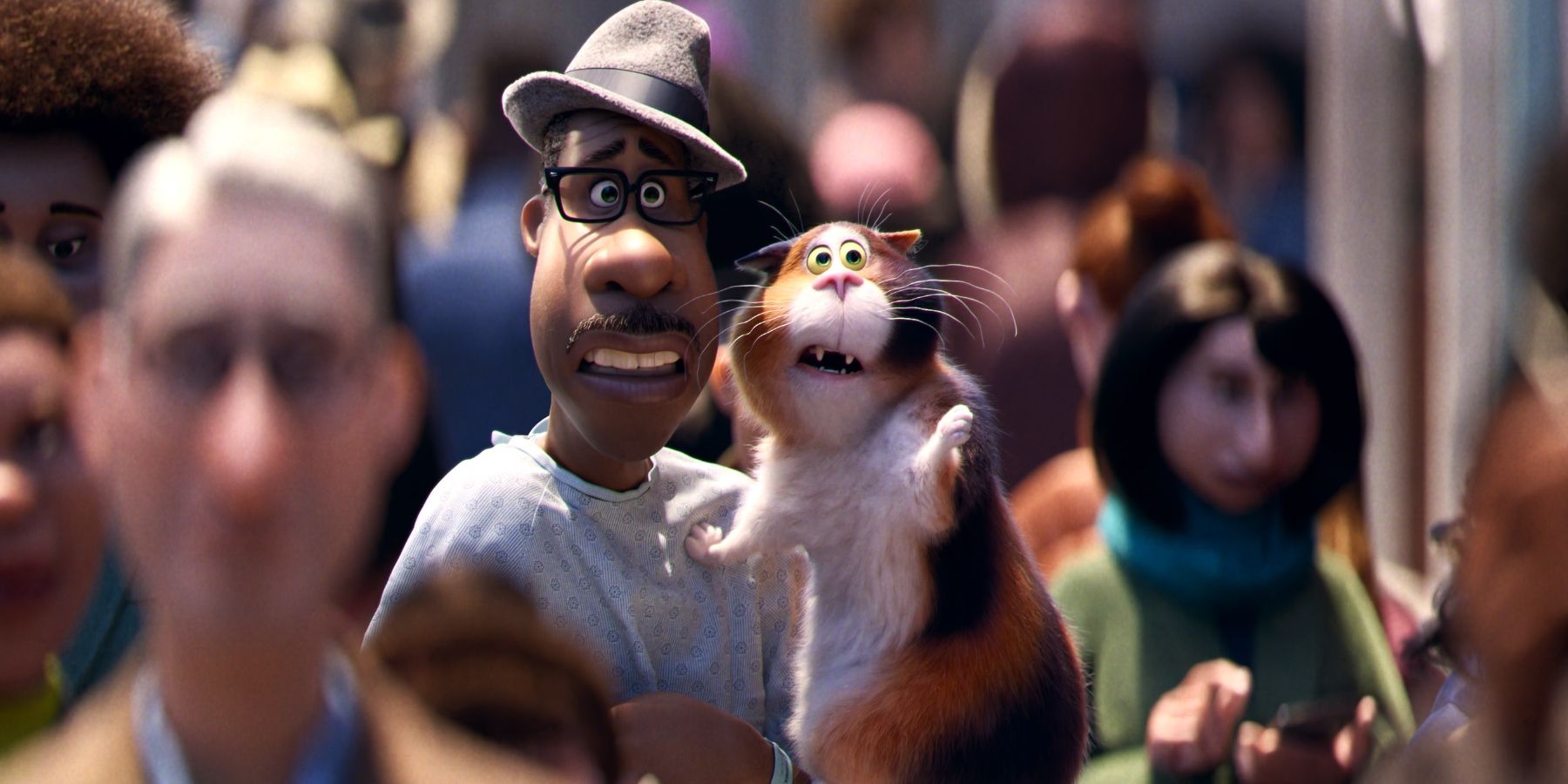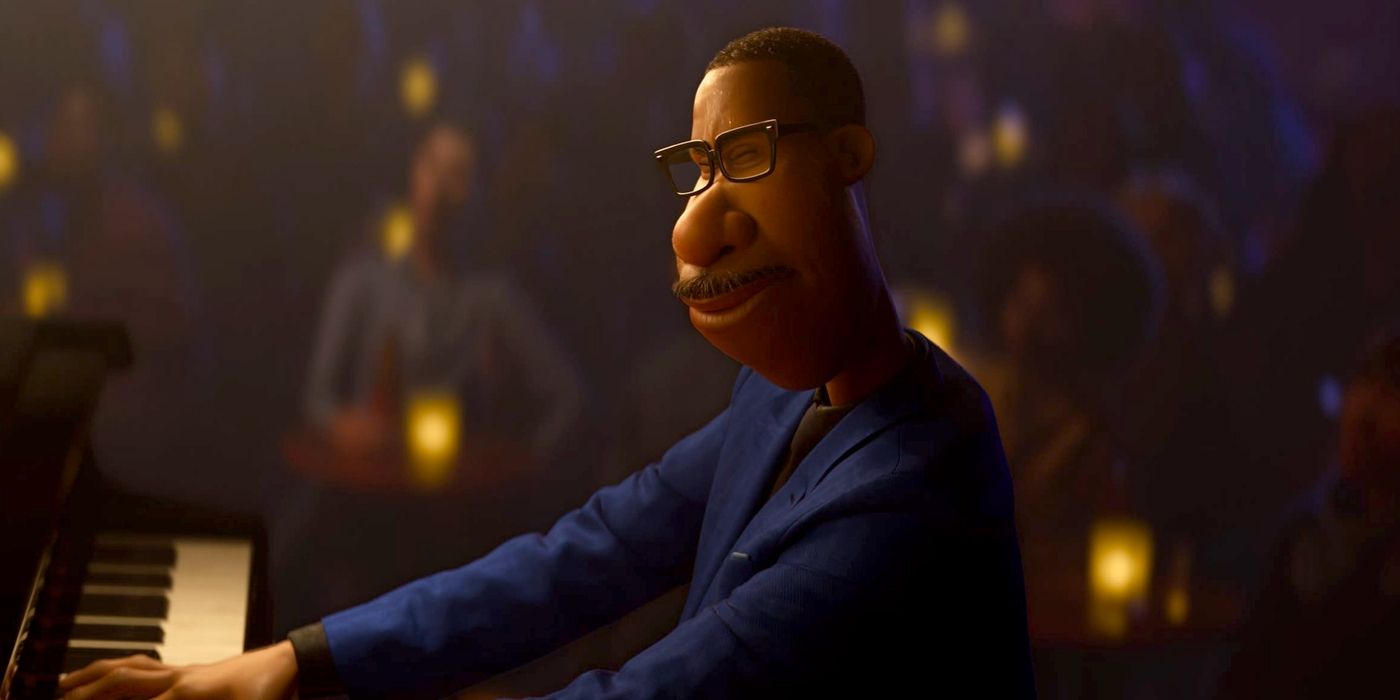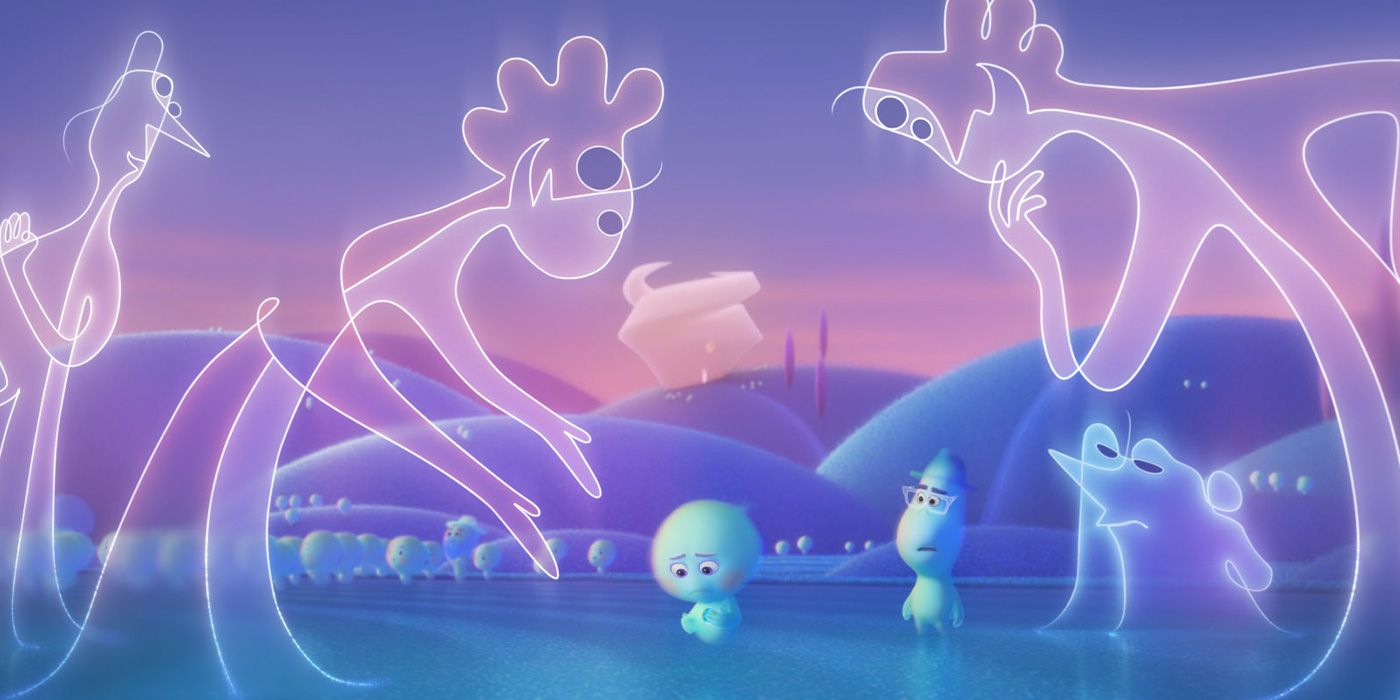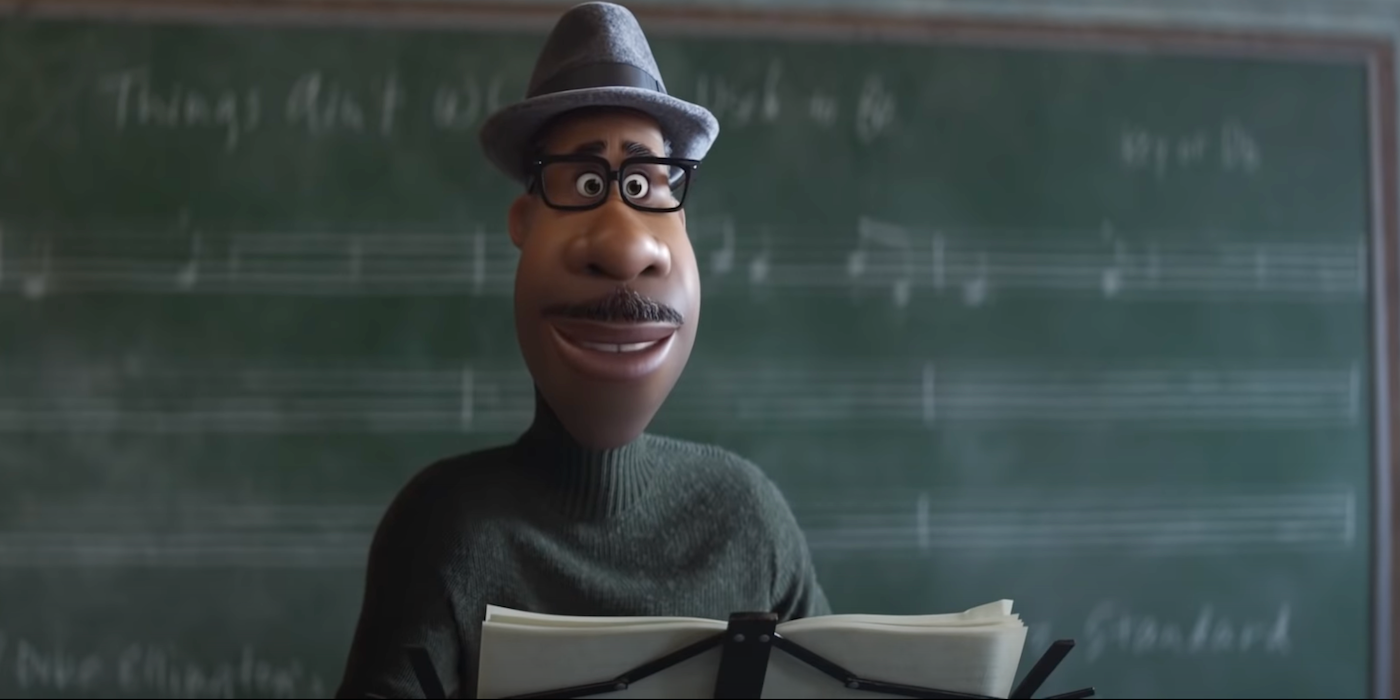From Pixar Animated Studios and co-directors Pete Docter and Kemp Powers, Soul follows Joe Gardner (voiced by Jamie Foxx), a middle school band teacher who finds himself in the fantastical Great Before, where new souls get their personalities before they go to Earth, before ever getting the chance to fulfill his dream of playing at the best jazz club in New York City. Determined to return to his life, Joe teams up with 22 (voiced by Tina Fey), who he must teach about the appeal of the human experience and what’s great about living, as they both go on a life journey together.
During a pair of press conferences for the film, cast members Jamie Foxx, Angela Bassett, Phylicia Rashad, and Tina Fey, along with filmmakers Pete Docter and Kemp Powers, talked about centering this story on an African American protagonist and authentically portraying the Black experience, developing this world, finding your own creative spark, not sacrificing one creative endeavor for another, and what they hope audiences will take from the film.
Question: You did such a great job in bringing the voices to bring this project to life, but how did you come to tell the story of a jazz musician and have this film be centered on an African American protagonist?
PETE DOCTER: At the very beginning, it was the personal story of trying, for myself, to figure this out. What are we going through? What’s the world about? What am I supposed to be doing with my life? I wanted to take people on this artist's journey of finding a character that we could root for and that we’d find compelling and interesting. We played around, for a little while, with an actor or a scientist, but as soon as we found a jazz musician, that felt very selfless. You don’t go into jazz to get rich and famous. You do it because you love it and you have a passion for it, and it’s fascinating to watch. When you see somebody play, they’re just amazing. It’s like a magic trick. So, as soon as we hit on that, one of our consultants called jazz Black improvisational music and we realized that we had to make this character Black. He had to be from the culture that brought us this great American art form. And so, we knew that we needed a lot of help with that. Dana [Murray] put together multiple groups of consultations, and we contacted Kemp Powers. We were lucky to have him along for the ride.
Kemp, can you talk about how the authenticity of the portrayal of jazz and of New York in this really complements the African American experience?
KEMP POWERS: When Dana and Pete first approached me to become involved in the film, the first thing I asked was, “What work of mine have you read?”And they had actually read a play of mine that I wrote, called One Night in Miami. So, I was like, “Okay, so you know what you’re getting into. You know my politics. You know that I’m gonna be pushing for a lot of Black stuff because I can’t help myself.” I think our culture is amazing, but a lot of people, particularly in Hollywood, will tell you that, in order to appeal to a wide audience, you wanna get away from that, and I feel the opposite. I feel like there is universality by going for hyper specificity. My number one defense is, do you not enjoy The Sopranos and The Godfather, if you’re not Italian? That sounds absurd. It’s specific to a very unique culture. I feel like this was a wonderful opportunity to do something that my family, my kids, my mom, and all of my relatives could be proud of, but that’s also something that everyone could enjoy and that could show how the Black American experience and our humanity is as universal as anyone else’s experience.
I remember that Joe getting a suit was a plot point and I said to Pete, “Well, he also needs a haircut, right?” And someone said, “Well, the haircut isn’t as important as the suit.” I said, “I wouldn’t have even come up just to Pixar for the interview, if I couldn’t have got lined up, so I’m gonna disagree. That haircut is every bit as important as the threads.” And I love that Jon Batiste actually backed me on that. In talking about what makes a person successful in jazz, Jon Batiste said, “It’s not just the talent, it’s the complete package.” It’s about the presentation. It’s about your body language. It’s about your threads. It was so great to have that be actually a plot point in this film. I love about what Pete and Dana encouraged us to lean into that stuff, as opposed to shying away from it. To be honest, there were a lot of times, in making this film, where I kept going, “Can we really do this? Are we gonna be able to say that jazz is Black improvisational music? Am I gonna be able to say he can’t catch a cab? Are we gonna be able to do all of these things? Honestly, No one even batted an eye. It’s part of what makes the texture of this film so rich and honest and sincere.
Pete, what did you use as your frame of reference, in developing this world?
DOCTER: The underpinnings of the story are very philosophical, so we looked at ancient Greece and were picturing the large fields where Plato would stand and pontificate. But then, we realized that we don’t want it to be specific to any culture. Everybody around the world started here, so it can’t be culturally specific. We experimented for awhile and looked ultimately at some World’s Fair images from the ‘40s and ‘60s. There were these big buildings that are meant to inspire and be austere. Some of them are shaped like big tires. Some of them are just cool abstract shapes. That was where we started, and we wanted it to feel explicit, as to what the purpose of these
buildings are.
Jamie, with Joe Gardner being a musician, was this very personal for you? Do you feel like this has a lot of aspects of who you are?
JAMIE FOXX: Donning this role and it being such a momentous role and, at the same time, having it involve music, that’s what I came out here to do. I know my grandmother, who’s looking down, would be proud that we are doing something like this. It’s such an incredibly weird time that what we’re going through. Something good needs to happen, and I think this is something great.
What do you remember about finding your own creative spark?
TINA FEY: A story that comes to mind is that, when I was in college, I studied drama at the University of Virginia and, like everybody, I mostly wanted to be an actor. But then, the first time I took a playwriting class and I wrote a one-act play, and I was not in the play, I sat back and watched other people get laughs and stuff from something that I wrote, and it was such a unique thrill that something opened in my brain and I went, “Oh, I think this is it for me.”
PHYLICIA RASHAD: When I was 11 years old and I stood in a spotlight, and couldn’t see anything but light, I held a script of everything that I was supposed to say, but because I’d rehearsed so thoroughly, I knew it by heart, so I just talked to the light, all night long. This was in a great program in the elementary schools in Houston, and when the mothers came to collect their children, I heard one of them say, “There she is. There’s the little girl who spoke so beautifully. Isn’t she beautiful?” That’s manna from heaven, for an 11-year-old, especially one who doesn’t think herself as pretty, at all. So, I thought, “When I grow up, I’ll be an actress and play in the light, and I’ll be beautiful, all the time.”
ANGELA BASSETT: One of the first moments for me was on stage at Eckerd College in Saint Petersburg, Florida, in a little summer after school program. We had the pageant and we had to exhibit a talent, so I did a reading. I fell in love with the poetry of Langston Hughes, so I did a couple of those poems. It went over very, very well, and it came along with a prize. Being able to use that poet laureate’s words to express myself, to express drama, and to have, and to see the reaction of the audience was the beginning of something.
Who are the mentors in your life who helped you find your creative spark?
FEY: My parents were huge mentors. They encouraged me to pursue the arts and they didn’t ask me to have something to fall back on. And then, there were a lot of the teachers that I had. I had writing teachers in regular public school in Pennsylvania, who encouraged me. And of course, I always have to mention Lorne Michaels, who I worked for and still work with, for over 20 years now. He’s taught me so much about how to be a good boss, as well as a good producer.
When was the last time you found yourself in the position of needing to find your purpose again?
BASSETT: I would say maybe a couple of years ago when I was feeling a bit of frustration or just a general malaise. To get back, it really is about just sitting still and really being appreciative of all that’s around and who that’s around, and just being reflective of life, and how far you’ve come and from whence you’ve come. Sometimes those moments do come and wrap you up a little bit, but they come to pass. They don’t come to stay.
Jamie, Joe discovers the little things that he took for granted, through 22's discoveries. With what we’ve experienced this year, can you relate to that?
FOXX: Yeah, I can. 2020 has been bittersweet for me. I’m living now in a situation where my family has been affected by someone we love very dearly – my sister – having transitioned. The one thing about my sister is that she always lived every single moment to the tilt. She had Down syndrome, and she loved music. She came to live with me, 18 years ago, when she got out of high school. I did a video, called “Blame it on the Alcohol,” and that video had Ron Howard, Samuel Jackson, Jake Gyllenhaal, Quincy Jones and everybody, but my sister was like, “Big bro, don’t forget me because I wanna do my dance solo.” I said, “All right, I got you.” And I looked down and she had a little purse with hair hanging out of it. I said, “What’s the hair?” She said, “Oh, that’s my ponytail. I’m gonna put that in when it’s time to do my thing.” And she did her thing and set the world on fire. The Down syndrome community saw her and she became the ambassador for 11 years. And so, when you talk about the little things, she always reminded me. She was always so excited. So, when you look at this film, it is exactly what I am now going through, with the bittersweet of losing someone, but gaining a vision of joy. All of the things that she taught us while she was living, in a beautiful, strange way, it’s exemplified in this film. The world has been here, however many millions or billions of years, so 70, 80, 100 is the blink of an eye. So, I say to everybody, “Don’t waste your blink. Live your life.”
Tina, since this is your first time working with Pixar, what was your experience like, working with Pete Docter and Kemp Powers? Did you work with them both in the vocal booth?
FEY: It was great. I was so thrilled and curious to get the chance to see how Pixar works, from the inside. Kemp and Pete were always there, for all of our recording sessions, and they would read with you and give suggestions. They had this great balance of being open to suggestions, but also being so fully prepared that they were able to steer you, if you were down a road that they knew they weren’t gonna use. They could very graciously steer you back to the right path.
As a character, 22 is absolutely hilarious. How much of that was improv and how much was just the script?
FEY: Kemp [Powers]’ script was really strong. I went in for a lot of sessions, and I would come back and there would be rewrites and new pages of sequences as they evolved. There were tiny bits of improv, here and there, but you can really only do that when the structure is solid and the script is really good. So, the credit really goes to Kemp and Pete [Docter].
Angela, how does playing a musician shape the sound and rhythm of your character’s speech, since your entire performance is through your voice?
BASSETT: That’s interesting. All I had, literally, were the words on the page. I didn’t have the music, I didn’t have her composition, I didn’t have her moment of when she’s in the zone. What I did have is what she’s worked hard for and what’s before her right now. She’s the gatekeeper of her own excellence. She’s the gatekeeper of all that she’s built and she takes that very, very seriously. So, of course, she’s gonna approach the music with that same degree of excellence and passion and creativity, as Mr. Baptiste comes up with it. I was very pleased to see that he did that.
Jamie, since music is such an integral part of the very fabric this, what was some of the music that helped you get into the zone for this role?
FOXX: There were so many different musicians, from Thelonious Monk to Baptiste, himself. I always revert back to Ray Charles and meeting him, and his vast knowledge of music, and all of these cats that you may not even know. I was in college on a classical piano scholarship, and I met Marvin Gaye’s manager, not too long after Marvin Gaye had transitioned, and our first conversation was about jazz and these guys that he’d had an opportunity to hang out with. He talked about how great jazz is as many notes as you want and as many notes as you can fill in. How masterful must you be to rise to the top of the jazz world? If you think about it, music is only from that C note to that B note, and then it repeats itself. It’s those notes in between that those guys built wonderful worlds in between, so that when you close your eyes, you actually go to a different place. So, all of those guys are very instrumental in all of the things that I do. It always revolves around music.
Joe goes back to Earth because of his love of music. What album or singer would make you come back from the afterlife, just so you could listen to them?
RASHAD: I am a big fan of Smokie Norful. He’s musically adept, he’s powerful, he’s flexible, and his lyrics have great meaning. I’d come back to listen to him.
BASSETT: Someone who just jumped into my mind, is Cesária Évora. Her music is just magical. She’s a mature woman of the earth. Her music is very romantic, but it’s also very now. I would come back to see her perform.
FEY: I would say Ella Fitzgerald for The Songbooks, so I could get a good double CD of Ella and all of the Cole Porter songbooks.
Jamie, being a multi-hyphenate performer, have you ever felt like you’ve had to sacrifice one creative endeavor for another?
FOXX: Oh, wow, a multi-hyphenate? I’m gonna use that one. I’m gonna take that one. I was actually lucky. I remember being on In Living Color, and being told by an executive,”Foxx, stick to the jokes, man. You ain’t gonna be able to do all this singing.” I was always singing in my dressing room. And I remember Tommy Davidson getting my back and saying, “No, he should do everything.” And then, a wonderful thing happened and things opened up. When they opened up, I took advantage of it by being able to have Kanye West at my house when he was just the first Kanye, and there was Puff and a young Jay-Z. Nobody knew who Jay-Z was. And there was a young guy standing in my garage who said, “I’m part of The Neptunes. My name if Pharrell.” Imagine this little, small house with Missy Elliott, Puff, Jay-Z, and a young Kanye. The next thing you know, Kanye started singing, “She said she wants some Marvin Gaye, some Luther Vandross . . .,” and the next thing you know, the music happens.
What happened was that I outgrew the Wanda character from In Living Color. I was years removed from that. Most people knew me as a girl. And then, the younger generation said, “That’s the dude that sings with Kanye and Drake. I didn’t have to sacrifice anything, but I had to be very careful that we at least had to be successful with it. Had “Slow Jamz” and “Gold Digger” not worked, then we would have had to sacrifice some things. So, you can do it all, but you just have to respect them all.
Phylicia and Angela, there aren’t very many animated Black women on screen. What did it mean to you to be able to do that, and what did you think of the character design, when you first saw the characters?
BASSETT: You’re right, there aren’t many, and I’ve been fortunate enough to portray a handful of them. It means a great deal, the more and more that we get these stories, these images, and these opportunities out there. We think of animation as for the youngsters, but it’s also families. If we can start early with these images and this idea that it’s a vast universe that’s diverse, it’s a great thing.
RASHAD: Most things I’ve done have really specific to African American people. That’s been true of my work in theater. It’s certainly been true of my work in film and television. So, it seems quite natural to me that this is what I’m doing. I look forward to a time when it’s so natural to everyone that this question need not be asked.
Did the experience of being a part of this film allow you to reflect deeply on the themes it addresses, such as life, death, and art?
FEY: The film does get you to reflect on these topics. I think the film does a really interesting thing, where they go a step beyond just saying, “You’ve gotta find you passion in life.” They also bring up the idea that an all-consuming passion can overtake your life. It’s about being present. That’s as important as achieving. Especially coming out in 2020, it’s a year when we’re all taking stock of what it means to have had a good year and what it means to have been successful in your life. It often now means taking the small joys where you can find them and being present with the people that you love.
How has Soul changed your outlook on life?
RASHAD: It hasn’t changed my outlook on life, at all. It has reaffirmed it.
FEY: I think it was more of a helpful reminder that life isn’t defined by achievement and attainment, but by enjoying the process. The road to where you wanna go is also part of your life and should be lived fully.
Jamie, what is your advice for young Black men and women who are trying to navigate in the entertainment industry and keep their morality?
FOXX: What I tell them is, do not fatigue. Do not lay your art to the side. If I talk to Michael B. Jordan or Chadwick [Boseman] or Chris Brown, I just say, “The opportunity is so wide open now, so you’ve gotta run. You have to take advantage of it. They didn’t have no platforms when I was coming up. There was no Snap Crackle, nothing. Now, you have it all. Sometimes the artist leans back and relies on the social platform as opposed to pushing their art. Where is the young kid under 30, that we’re looking at, that’s Larenz Tate. Where is the young girl under 30 that’s Halle Berry. I continuously tell the young artists, this is the best time because somebody is gonna see you, if you stay in it.
What do you hope audiences will take away from this movie?
BASSETT: I hope they take away their own special brand of uniqueness – their personality, their quirks, their gifts, and their talents – and know that’s an important asset to the world, to the community, and to the family that’s around you. This talks about being focused on your dreams, but maybe sometimes too much focus or hearing the negative chatter from outside can derail you and take you to a dark vortex or space. I hope they just take away positiveness. You’re special, you’re unique, and you’re destined for this journey, so live it with gusto, live it with pride, and live it with spark and vitality.
POWERS: One of my favorite things about the message this film portrays is that we always see films about pursuing your dream, but I really love the fact that this film shows people that all lives have merit. It’s this idea that you don’t have to have it all figured out. We have a society that, from the time we’re very, very young, we’re really taught to make a decision about what you want to do when you grow up. The idea that everyone sitting in that audience should be able to see their lives represented on the screen, that’s something that I really hope for because I do feel that all lives are valuable. People don’t have more valuable lives based on how famous or how rich they are.
DOCTER: A lot of us grew up with this idea that we need to earn our way into being worthy. That’s why a lot of times, some of these goals end up being self-limiting. One of the aims of the movie is to say that, just by being alive, we are valued. We are already enough. We all deserve to enjoy what life has to offer. All you have to do is open your eyes and look around.
Soul is available to stream at Disney+ on December 25th.




